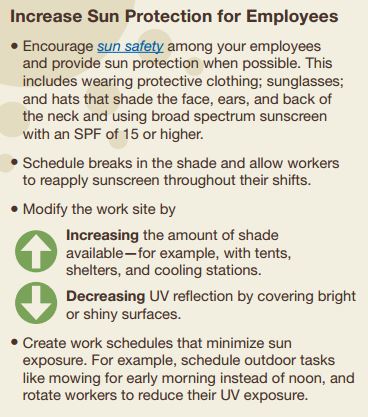
The number of skin cancer cases in the United States continues to increase, with nearly 5 million people treated for it every year, according to the Centers for Disease Control (CDC). Outdoor workers are especially at risk, as they are constantly exposed to ultraviolet (UV) rays, even on cloudy days when they may think they are safe from the sun.
According to the National Institute for Occupational Safety and Health (NIOSH), UV rays, which are a part of sunlight, are an invisible form of radiation. There are three types of UV rays: UVA, which is believed to  damage connective tissue and increase the risk for developing skin cancer; UVB, which doesn’t penetrate as deeply into the skin, but can still cause some types of skin cancer; and natural UVC, which is absorbed by the atmosphere and does not pose a risk.
damage connective tissue and increase the risk for developing skin cancer; UVB, which doesn’t penetrate as deeply into the skin, but can still cause some types of skin cancer; and natural UVC, which is absorbed by the atmosphere and does not pose a risk.
One of the dangers of being out in the sun for prolonged periods is that sunburn is not immediately apparent, NIOSH said. Symptoms usually start about 4 hours after sun exposure, worsen in 24 to 36 hours, and get better in 3 to 5 days. They include red, tender and swollen skin, blisters, headache, fever, nausea and fatigue. Another danger is that eyes can also become sunburned. They become red, dry, painful and feel gritty. Chronic eye exposure can cause permanent damage, including blindness.
The CDC advises organizations to add sun safety to their workplace policies and training programs, as well as to:Include sun-safety information in workplace wellness programs. For example, programs designed to help employees avoid heat illness can be adapted to include information about sun safety.
• Teach outdoor workers about risks of exposure to UV radiation and the signs and symptoms of overexposure.
• Encourage outdoor workers to be role models and discuss the importance of sun protection with clients, and coworkers. Visit the National Cancer Institute’s RTIPs website for more information about sun safety.
NIOSH’s advice to workers:
Protect Yourself
- Avoid prolonged exposure to the sun when possible.
- Wear sunscreen with a minimum of SPF 15.
- SPF refers to how long a person will be protected from a burn. (SPF 15 means a person can stay in the sun 15-times longer before burning.) SPF only refers to UVB protection.
buy priligy online www.delineation.ca/wp-content/uploads/2023/10/jpg/priligy.html no prescription pharmacy
- To protect against UVA, look for products containing: Mexoryl, Parsol 1789, titanium dioxide, zinc oxide, or avobenzone.
- Sunscreen performance is affected by wind, humidity, perspiration, and proper application.
- Throw away sunscreens after 1–2 years (they lose potency).
- Apply liberally (minimum of 1 oz.) at least 20 minutes before sun exposure.
- Apply to ears, scalp, lips, neck, tops of feet, and backs of hands.
- Reapply at least every two hours and each time a person gets out of the water or perspires heavily.
- Some sunscreens may lose their effectiveness when applied with insect repellents. You may need to reapply more often.
- SPF refers to how long a person will be protected from a burn. (SPF 15 means a person can stay in the sun 15-times longer before burning.) SPF only refers to UVB protection.
- Wear clothing with a tight weave or high-SPF clothing.
- Wear wide-brimmed hats and sunglasses with UV protection and side panels.
- Take breaks in shaded areas.
First Aid
- Take aspirin, acetaminophen, or ibuprofen to relieve pain, headache, and fever.
- Drink plenty of water to help replace fluid losses.
- Comfort burns with cool baths or the gentle application of cool wet cloths.
- Avoid further exposure until the burn has resolved.
- Use of a topical moisturizing cream, aloe, or 1% hydrocortisone cream may provide additional relief.
buy symbicort online www.delineation.ca/wp-content/uploads/2023/10/jpg/symbicort.html no prescription pharmacy
If blistering occurs:
- Lightly bandage or cover the area with gauze to prevent infection.
- Do not break blisters. (This slows healing and increases risk of infection.)
- When the blisters break and the skin peels, dried skin fragments may be removed and an antiseptic ointment or hydrocortisone cream may be applied.
Seek medical attention if any of the following occur:
- Severe sunburns covering more than 15% of the body
- Dehydration
- High fever (greater than 101 °F)
- Extreme pain that persists for longer than 48 hours
